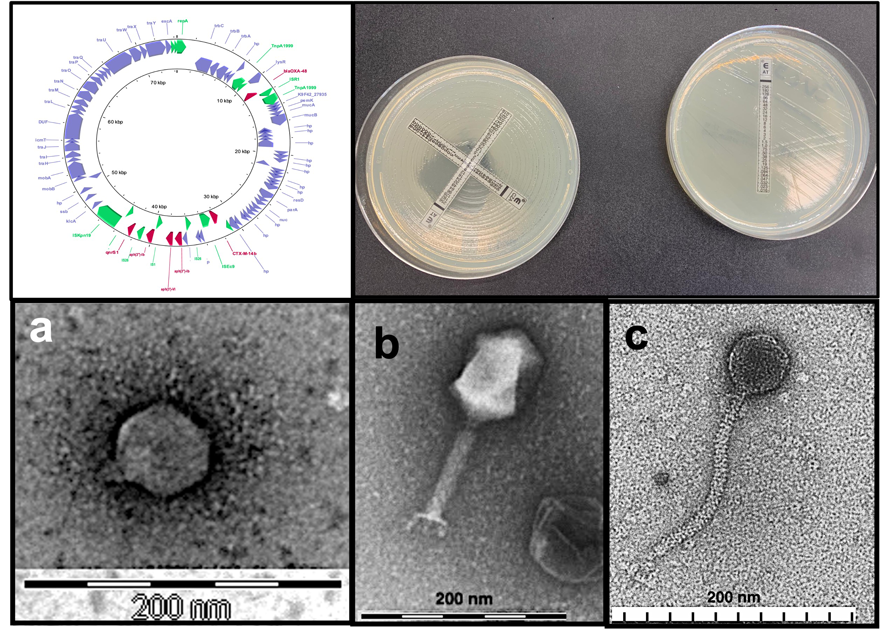[1060] Infections caused by multi-resistant Gram-negative bacteria
Carbapenemase plasmid genomic map and synergistic effects of antimicrobials are shown (upper row), EM photographs of podoviral (A), myoviral (B) and siphoviral (C) phages (lower row)

The research laboratory for multi-resistant Gram-negatives (Diego Andrey group, infectious diseases department) conducts research aimed at
I) understanding the molecular mechanisms of resistance in Gram-negatives
II) their characterization at the genomic level, with attention particularly, on plasmids
III) new approaches or anti-Gram negative treatments (such as phages).
We apply a broad range of cutting-edge technologies and analytical approaches, including whole bacterial genome sequencing with nanopore technology, to address knowledge gaps in the area of antimicrobial resistance in Gram-negative bacteria.
Our main current research projects are:
I) Mechanistic study of multi-resistant Gram-negative pathogens, and particularly Klebsiella pneumoniae, in particular resistance to carbapenems and new combinations with beta-lactamase inhibitors, but also resistance to chlorhexidine, fosfomycin and colistin. We characterized at the molecular level the effect of a W20S point mutation in the gene encoding MgrB on colistin resistance, in KPC-producing clinical strains. We are also in the process of characterizing the effect of the transcriptional regulator SmvR on resistance to chlorhexidine.
II) Genomic study of multi-resistant Enterobacteriaceae, and particularly of their plasmids coding for resistance and/or hypervirulence genes. Molecular epidemiology of resistant strains and their plasmids. Study of the impact of indirect nosocomial transmission mediated by plasmids in the hospital environment, in particular plasmids carrying the carbapenemase OXA-48 and OXA-181. We are part of the RESERVOIR consortium, (project led by Prof. S. Harbarth for Unige), and have multiple collaborations with the SPCI service team. We also have strong collaborations with teams in Latin America, Prof Ana Gales, Escola Paulista de Medicina, Brazil and Prof Maria-Virginia Villegas, UEB, Colombia (Andrey et al. Clin Infect Dis. 2020).
III) Phages as an alternative therapy to target multidrug-resistant Gram-negatives including Klebsiella pneumoniae. The GenPH collection is a (bio)bank project where we have isolated more than 180 phages targeting Klebsiella pneumoniae, by capsular type, allowing us to offer personalized phages for future clinical applications and to better understand the mechanisms of bacterial resistance to phages within the framework of these approaches.
